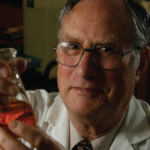His first mentor, Thomas B. Tomasi, MD, PhD, was a powerful influence during his years at the University of Vermont’s College of Medicine in Burlington: “I modeled myself after him,” says Dr. Reichlin; he followed Dr. Tomasi to the State University of New York at Buffalo in the mid-1960s. There he handled a demanding schedule, taking on dual appointments, moving from associate to assistant to full professorships of medicine and biochemistry. It was also in Buffalo that Dr. Reichlin began his studies to define antigenic targets reactive with antibodies in sera from patients with SLE.
Early on in his academic career, Dr. Reichlin’s research was intertwined with his clinical rheumatology work. “I was seeing patients with rheumatic diseases, and realized that there was a big gap in the knowledge of the chemistry associated with those syndromes,” he says. “It was an easy transition to do research on the chemistry of autoimmunity, which was obvious in all the connective tissue diseases, especially lupus, but also in inflammatory myopathy, scleroderma, and Sjögren’s syndrome.”
Patient-Oriented Science
Dr. Reichlin has mentored predoctoral and postdoctoral fellows who have established active research programs in the United States and around the world, imbuing in them the values of translational research. “He is the quintessential triple-threat rheumatologist,” says Judith A. James, MD, PhD, who came to OMRF as an undergraduate student in 1988, fully expecting to become a pediatric allergist and immunologist. She was so transfixed by the work she was doing in Dr. Reichlin’s and Dr. Harley’s laboratories that she changed the course of her own career, becoming a rheumatologist and following the academic American Board of Internal Medicine pathway. She was the first, with Dr. Reichlin’s encouragement and support, to come through the official MD/PhD program at the University of Oklahoma. In awe of Dr. Reichlin and his reputation when they first met, Dr. James notes that she has always appreciated his “interest in doing great science, and in understanding how this science would be directly relevant to patients.” Dr. Reichlin also emphasized “how important it was to have a broad exposure in science and clinical medicine,” she recalls. “You never knew where a lesson learned in another discipline might become directly relevant in rheumatology.” Dr. James is now program chair of the Arthritis and Clinical Immunology Program as well professor of medicine at the University of Oklahoma Health Sciences Center. When she became a faculty member, Dr. Reichlin transferred care of some of his patients to her, some of whom, after well over a decade, “still call themselves ‘Dr. Reichlin’s patients,’ ” she says wryly.
Setting the Tone
Dr. Harley was the first faculty member recruited to the OMRF arthritis program, an appointment made possible by an endowment to the foundation. As a leader, Dr. Reichlin “was supportive and didn’t interfere,” says Dr. Harley. “Presenting to him was always a great thing because he thought creatively, and was able to suggest the perfect experiment or interpretation of your data,” says Robert H. (“Hal”) Scofield, MD, who joined OMRF as a postdoc and then became a faculty member.


